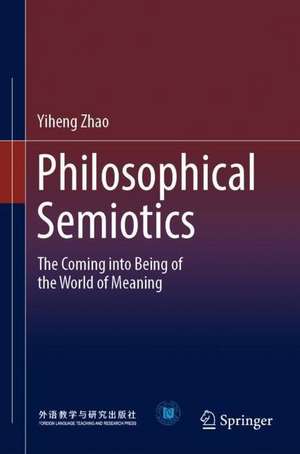Philosophical Semiotics: The Coming into Being of the World of Meaning
Autor Yiheng Zhao Traducere de Xiaoli Fang, Xu Zhangen Limba Engleză Hardback – 15 sep 2022
This book particularly exemplifies the semiotic connections in various schools of traditional Chinese philosophies. In the “Pre-Imperial Age” (before BC 300), there emerged an abundance of semiotic thinking in China, from Yijing the first sign system that aims to explain everything in the world, to the Namists’s subtle argument about the form of meaning, from the Yin-Yang/five elements of the Han, to the “Things are non-existent while mind is non-non-existent” principle of theVijñāptimātratāsiddhi School of Buddhism in the Tang, and from the Sudden Revelation of Chan Buddhism to the “Nothing outside the mind” endorsed by the Mindist Confucianism in the Ming. The mighty trend of philosophical heritage provides rich food to our understanding of the form of meaning.
| Toate formatele și edițiile | Preț | Express |
|---|---|---|
| Paperback (1) | 412.13 lei 6-8 săpt. | |
| Springer Nature Singapore – 16 sep 2023 | 412.13 lei 6-8 săpt. | |
| Hardback (1) | 419.43 lei 6-8 săpt. | |
| Springer Nature Singapore – 15 sep 2022 | 419.43 lei 6-8 săpt. |
Preț: 419.43 lei
Nou
Puncte Express: 629
Preț estimativ în valută:
80.26€ • 84.02$ • 66.41£
80.26€ • 84.02$ • 66.41£
Carte tipărită la comandă
Livrare economică 05-19 aprilie
Preluare comenzi: 021 569.72.76
Specificații
ISBN-13: 9789811930560
ISBN-10: 9811930562
Pagini: 122
Ilustrații: XII, 122 p. 7 illus., 3 illus. in color.
Dimensiuni: 155 x 235 mm
Greutate: 0.37 kg
Ediția:1st ed. 2022
Editura: Springer Nature Singapore
Colecția Springer
Locul publicării:Singapore, Singapore
ISBN-10: 9811930562
Pagini: 122
Ilustrații: XII, 122 p. 7 illus., 3 illus. in color.
Dimensiuni: 155 x 235 mm
Greutate: 0.37 kg
Ediția:1st ed. 2022
Editura: Springer Nature Singapore
Colecția Springer
Locul publicării:Singapore, Singapore
Cuprins
Plurality and Complexity of the World of Meaning.- The World of Objects and the World of Practical Meaning: Cognition, Understanding, and Efficacy.- World of Thoughts: Categories and Planning.- The Position of Games and Art in the World of Meaning.- The Meaning of The Meaning of Meaning.- Formal Intuition.- Heterogeneity of the Objects.- Aperception and Appresentation: the Minimum Form of Meaning.- Indexicaity as the Firstness of the Sign.
Notă biografică
Yiheng Zhao is Professor of Semiotics & Narratology, Sichuan University, and Director of the Institute of Semiotics & Media Studies (ISMS). Born in 1943, he did his M.A. in 1981, and Ph.D. at the University of California, Berkeley. He started teaching at the University of London in 1988 and resettled in the Sichuan University in 2005. He is Member of the Collegium of the International Association of Semiotic Studies and Chair of the Academic Committee of the Chinese Association of Semiotics & Communication Studies. He has written and edited around 30 books, including his “Three Books on Meanings”: Semiotics Principles & Problems, A General Narratology, and Philosophical Semiotics. He has won numerous awards including Fulbright Award for Research in the USA (1981), Foreign Literature Study Award(1984),Comparative Literature Association Award (1986), Sichuan Social Sciences and Philosophy Honorary Award (2015), Chinese University Press Award (2018), Ministry of Education Award (2020), among others.
Textul de pe ultima copertă
This book attempts to solve the question whether semiotics is a methodology as is generally held and if the studies of meaning and the mind can shed light on a series of metaphysical issues, so that the edifice of semiotics could be erected on a philosophical ground. It proposes that a philosophical semiotics is, by necessity, a semiotic phenomenology about the construction of the “world of meaning” by signs, and any discussion about semiotics has to proceed around two core issues: meaning and the mind.
This book particularly exemplifies the semiotic connections in various schools of traditional Chinese philosophies. In the “Pre-Imperial Age” (before BC 300), there emerged an abundance of semiotic thinking in China, from Yijing the first sign system that aims to explain everything in the world, to the Namists’s subtle argument about the form of meaning, from the Yin-Yang/five elements of the Han, to the “Things are non-existent while mind is non-non-existent” principle of theVijñāptimātratāsiddhi School of Buddhism in the Tang, and from the Sudden Revelation of Chan Buddhism to the “Nothing outside the mind” endorsed by the Mindist Confucianism in the Ming. The mighty trend of philosophical heritage provides rich food to our understanding of the form of meaning.
This book particularly exemplifies the semiotic connections in various schools of traditional Chinese philosophies. In the “Pre-Imperial Age” (before BC 300), there emerged an abundance of semiotic thinking in China, from Yijing the first sign system that aims to explain everything in the world, to the Namists’s subtle argument about the form of meaning, from the Yin-Yang/five elements of the Han, to the “Things are non-existent while mind is non-non-existent” principle of theVijñāptimātratāsiddhi School of Buddhism in the Tang, and from the Sudden Revelation of Chan Buddhism to the “Nothing outside the mind” endorsed by the Mindist Confucianism in the Ming. The mighty trend of philosophical heritage provides rich food to our understanding of the form of meaning.
Caracteristici
Attempts to make semiotics not merely a methodology but a philosophy Suggests a systematic argument about meaning on the base of Peircian semiotic phenomenology Integrates the Chinese semiotic thoughts in the classical philosophy
